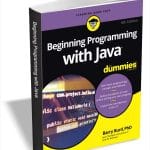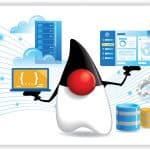Java underpins enterprise app modernization plans

A new report from provider of Java web application platforms, Vaadin, looks at how enterprises build, deploy, and modernize Java applications in 2023 and also reveals trends and future plans for the use of Java in enterprise applications.
Java is used heavily for both internal (64 percent) and customer-facing (62 percent) applications, which include both SaaS and internet-based services. However, Almost half of Java applications still need modernization.
Why app modernization shouldn't hold back digital transformation [Q&A]

Digital transformation projects often rely on the updating or replacing of apps, but that can put a brake on the speed of progress.
Many enterprise apps rely on established systems like Java which have been around for a long time but still remain popular. We spoke to Kim Weins, VP of products at open source web development platform Vaadin, to find out more about the challenges of bringing enterprise apps up to date.
Get 'Beginning Programming with Java For Dummies, 6th Edition' (worth $18) FREE for a limited time

Consider Beginning Programming with Java For Dummies your indispensable guide to learning how to program in one of the most popular programming languages -- Java! Java is an invaluable language to master, as it's widely used for application development, including Android, desktop, and server-side applications.
Beginning Programming with Java For Dummies is written specifically for newbies to programming. The book starts with an overview of computer programming and builds from there; it explains the software you need, walks you through writing your own programs, and introduces you to a few of the more-complex aspects of programming in Java.
96 percent of known open source vulnerabilities can be easily avoided

With more open source being consumed than ever before, attacks targeting the software supply chain have increased too, both in frequency and complexity. A new report reveals a 633 percent year on year increase in malicious attacks aimed at open source in public repositories -- this equates to a 742 percent average yearly increase in software supply chain attacks since 2019.
The latest State of the Software Supply Chain Report from Sonatype, released today at the DevOps Enterprise Summit, also finds that 96 percent of open source Java downloads with known-vulnerabilities could have been avoided because a better version was available, but was ignored.
Microsoft launches new resource site for Java developers

Whether you're currently a Java developer, someone looking to get started, or if you sit somewhere in the middle and you're looking to up your coding game, Microsoft has a new resource site for you to check out.
Described as a one-stop shop for Java developers, the site includes beginner guides to getting started in Java coding. The site also features information about deploying and scaling Java apps, and has tips and more to help developers code productively.
What are Log4Shell and log4j and should you be worried about them?

At the end of November a vulnerability targeting Minecraft servers was uncovered. If you don't play Minecraft you probably didn't pay it much attention.
Since then, however, 'Log4Shell' has surged across the web sending tremors through the security community and prompting the US government to describe it as a 'severe risk'. So, what's going on and is it time to panic?
Microsoft previews its open source Java distribution for Windows, macOS and Linux -- Microsoft Build of OpenJDK

Microsoft has launched a preview version of its own distribution of Java, making it available for Windows, macOS and Linux. The company has named the release Microsoft Build of OpenJDK, and describes it as its "new way to collaborate and contribute to the Java ecosystem".
The company has made available Microsoft Build of OpenJDK binaries for Java 11, which are based on OpenJDK source code. Microsoft says it is looking to broaden and deepen its support for Java, "one of the most important programming languages used today".
Happy 25th birthday, Java!

Few things have stood the test of time in the Internet era. Technologies come and go at a rapid pace, as we create new and better tools to help us solve more and more complex problems. Once they've served their purpose, we bid them adieu and move on. Loyalty plays no part here. You either adapt or are left behind.
Looking back, you can (still) name a couple of game-changing products and technologies born decades ago that we continue to enjoy today. If you're a consumer, you're probably thinking of Windows or the Mac. If you're a software engineer, Java's high up on your list. And for good reason. As it celebrates its 25th birthday this weekend, it remains at the top of its game as one of the most popular programming languages ever created. Happy birthday, old timer!
Jamstack -- what is it and how is it changing edge computing? [Q&A]

Some of technology's biggest changes come in the form of new abstractions. Kubernetes raised the unit of abstraction from individual servers, to clusters, and completely redefined the winners and losers in backend infrastructure.
While Jamstack might sound like a particularly messy dessert -- it's actually short for Javascript, APIs, Markup stack -- this is the latest wave of abstraction, emphasizing how frontend teams call on APIs for backend services, instead of having to configure and maintain that infrastructure directly.
JavaScript is favorite language among developers

A survey of over 70,000 developers from around the world reveals that 73 percent say they are proficient in JavaScript.
The study from hiring platform HackerRank shows JavaScript has replaced Java which took the top spot last year.
Microsoft releases Java debugging extension for Visual Studio Code

Visual Studio Code is an amazing cross-platform code editor which has managed to attract a significant following in recent years, not least because of its support for extensions. In just a couple of clicks, users can add various languages, like Python, Ruby and Java, and create new software.
For example, if you want to write Java code, there is a pretty nifty extension made by Red Hat, called Language Support for Java(TM) by Red Hat, that features things such as IntelliSense and basic Eclipse and Grade project support. And, now, Microsoft is building upon it by adding a debugger to the mix.
Google makes Firebase SDKs open source

Today was day one of Google I/O and there was no shortage of news. To name a few, the search giant is bringing its assistant to iPhone, Smart Reply to Gmail on mobile, and voice-calling to Google Home. These things should be very interesting to both consumers and technology enthusiasts.
With I/O being a developer conference, however, not all of the news is necessarily consumer-focused. Case in point, there was some rather big developer news that didn't get as much attention. You see, Google announces that it is making five of its "Firebase" SDKs open source.
Starbucks embraces voice ordering through both its iOS app and Amazon Alexa

Starbucks coffee fuels the days of many people. While the company's beverages are a bit expensive compared to, say, McDonalds or 7-11, they are chock full of caffeine and very tasty. Quite frankly, I drink Starbucks coffee or tea pretty much every day, as I often work in its locations -- they have clean tables and free Wi-Fi.
The company has often embraced technology within its stores -- it offers a nice mobile app with Spotify integration, and many of its tables offer wireless smartphone charging. Today, the company rolls out voice ordering through its own mobile iOS app or Amazon Alexa. Unfortunately, the iOS feature will be limited to 1,000 beta testers at first.
Having mainframe problems? You're not alone

Enterprises that rely on mainframe are having a hard time delivering applications as fast as they need to, a new report by Forrester and Compuware has shown. Nine in ten (90 percent) of enterprises are having these issues, the report says, adding that it is a serious issue, as the majority of new business initiatives include the mainframe.
Almost half (48 percent) have moved some apps off the mainframe, which resulted in security issues, higher costs, poor performance and project delays. More than four in ten (41 percent) are trying to work around the mainframe, resulting in greater complexity, more expenses, double tooling and more security risks.
Oracle loses appeal against Google in Java API case

Oracle has once again been unsuccessful in its latest effort to obtain a new trial in its Java API copyright claim against Google. Judge William Alsup of the San Francisco District Court has denied Oracle's latest motion to have its case reheard on the grounds of misconduct on the part of Google's lawyers.
Since 2010, the two companies have been in an ongoing legal war that was ruled in Google's favor. However, in the six years that have passed Oracle has repeatedly appealed the ruling multiple times.
Recent Headlines
Most Commented Stories
BetaNews, your source for breaking tech news, reviews, and in-depth reporting since 1998.
© 1998-2025 BetaNews, Inc. All Rights Reserved. About Us - Privacy Policy - Cookie Policy - Sitemap.